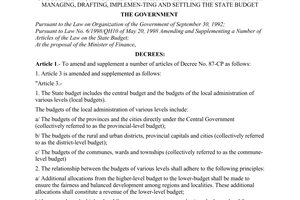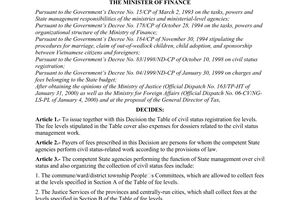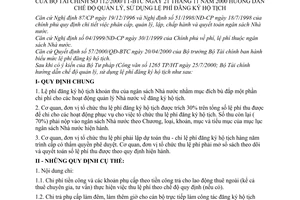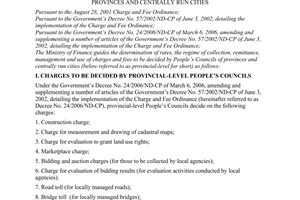Circular No. 112/2000/TT-BTC of November 21, 2000 guiding the regime of management and use of civil status registration fees đã được thay thế bởi Circular No. 97/2006/TT-BTC of October 16, 2006, guiding charges and fees to be decided by People’s councils of provinces and centrally run cities và được áp dụng kể từ ngày 12/11/2006.
Nội dung toàn văn Circular No. 112/2000/TT-BTC of November 21, 2000 guiding the regime of management and use of civil status registration fees
|
THE MINISTRY OF FINANCE |
SOCIALIST REPUBLIC OF VIET NAM |
|
No: 112/2000/TT-BTC |
Hanoi, November 21, 2000 |
CIRCULAR
GUIDING THE REGIME OF MANAGEMENT AND USE OF CIVIL STATUS REGISTRATION FEES
Pursuant to the Government’s Decree No. 87/CP of December 19, 1996 and Decree
No. 51/1998/ND-CP of July 18, 1998 detailing the assignment, management,
elaboration, execution and settlement of State budget;
Pursuant to the Government’s
Decree No. 04/1999/ND-CP of January 30, 1999 on charges and fees belonging to
the State budget;
Pursuant to the Finance Minister’s
Decision No. 57/2000/QD-BTC of April 20, 2000 promulgating the table of civil
status registration fee levels;
After obtaining the Justice Ministry’s
comments (Official Dispatch No. 1265 TP/HT of July 25, 2000); the Finance
Ministry hereby guides the regime of management and use of civil status
registration fees as follows:
I. GENERAL PROVISIONS:
1. Civil status registration fees constitute a source of State budget revenues to partly cover the expenses for the activities of State management over civil status registration.
2. Agencies and units organizing the collection of civil status registration fees shall be entitled to deduct 30% of the total collected fee amount to spend on the activities in service of the organization of civil status registration fee collection. The remainder (70%) must be remitted into the State budget according to chapters, series, clauses, items and sub-items of the current State Budget Index.
3. The fee-collecting agencies and units shall have to make annual civil status registration fee collection-spending estimates and submit them to the competent authorities for approval. The fee collecting agencies and units shall have to open books for monitoring and settling the collected fee amount according to current regulations.
II. SPECIFIC PROVISIONS:
1. Spending contents:
1.1. Expense for wage and wage-allowances paid to laborers hired from outside (including hired experts and consultants) for the collection of fees according to the prescribed regime (if any).
1.2. Expense for night-time and over-time work allowances for the officials directly engaged in the work of civil status registration according to the prescribed regime (if any).
1.3. Expense for printing (purchase) of civil status forms (including those for civil status registration for which the fees are not prescribed to be collected such as punctual death declaration registration, guardianship registration).
1.4. Expense in support of the verification (when there is a need to coordinate with other agencies), posting and announcement on mass media.
1.5. Reward fund deduction for civil status-justice officials who have recorded achievements in the management of civil status registration. The average annual per-head deduction level shall not exceed 3 months’ actually paid salary (for provincial-level officials) and 3 months’ cost-of-living allowance (for communal-level officials).
Particularly for the use of the 30% fee amount in the Vietnamese diplomatic missions and consulates overseas, the provisions at Point 2.a, Section III of the Finance Ministry’s Circular No. 64/2000/TT-BTC of July 3, 2000 guiding the regime of fee collection and payment, applicable to Vietnam’s diplomatic missions and consulates overseas, and Circular No. 90/2000/TT-BTC of September 1, 2000 supplementing and adjusting a number of points of Circular No. 64/2000/TT-BTC of July 3, 2000 shall apply.
The above-mentioned spending contents shall comply with current criteria, norms and regime.
2. Elaboration and execution of civil status registration fee collection and spending estimates:
2.1. Annually, basing themselves on the collection levels set by the Finance Ministry in the table of civil status registration fee levels, the spending contents prescribed in this Circular, and the current financial spending regime, the fee-collecting agencies shall make detailed civil status registration fee collection and spending estimates according to the current State Budget Index and send them to the managing agencies for approval, synthesization and submission to the finance bodies and, at the same time, to the competent authorities for approval.
2.2. Basing themselves on the collection and spending estimates already approved by the competent bodies, the fee-collecting agencies shall make detailed quarterly collection-spending estimates according to the current State Budget Index and send them to the managing bodies, the State Treasury where they make their transactions, and the finance bodies of the same level for use as basis for collection and spending control.
2.3. The units organizing the civil status registration fee collection shall have to open fee-collecting accounts at the State Treasury where they make their transactions. Once every 7 to 10 days, the collected fee amount must be remitted into the units’ revenue accounts opened at the State Treasury where their transactions are made.
2.4. Basing itself on the fee collection amount and spending estimates approved by the competent authorities, spending approval order of the unit’s head, and legal and valid vouchers and dossiers, the State Treasury shall make advances or payment for the unit according to the current regulations on the regime of management, allocation and settlement of State budget expenditures through the State Treasury and the provisions of this Circular. The expenses made at variance with the regime or in excess of the prescribed levels in the estimates already approved by the competent authorities must be paid out, recovered for remittance into the State budget. The persons issuing wrong spending orders shall have to compensate for public fund and be handled according to law provisions.
2.5. The fee-collecting agencies shall have to declare, collect, pay and manage the charge and fee amount according to current regulations.
3. Settlement of civil status registration fee collection and spending:
- The agencies and units organizing the civil status registration fee collection shall have to open accounting books for recording, accounting and settling the collection and spending of fees left to them according to the provisions in the Finance Minister’s Decision No. 999/TC/QD/CDKT of November 2, 1996 promulgating administrative and public-service accounting regime system.
- The managing bodies shall have to approve the civil status registration fee revenue-expenditure final settlement of the units under their respective management and include them in their settlement reports to be sent to the finance bodies of the same level for evaluation and announcement of the approval of such settlement together with the managing bodies’ annual settlement.
- In cases where the fee amount left to the unit for use has not yet been used up at the year-end, the remainder must be remitted into the State budget.
- The managing bodies shall have to coordinate with the finance bodies of the same level in regularly (or irregularly) inspecting the collecting units in order to ensure that the collection and spending comply with the prescribed regime.
III. IMPLEMENTATION ORGANIZATION:
The provisions of this Circular apply as from May 5, 2000. The other provisions on the use of civil status registration fees, which are contrary to this Circular, are now all annulled.
Any problems arising in the course of implementation should be promptly reported to the Finance Ministry for study and settlement.
|
|
FOR THE MINISTER OF FINANCE |




